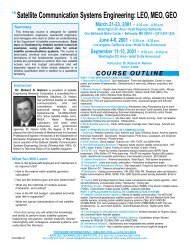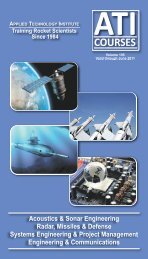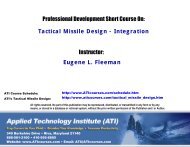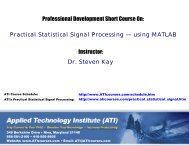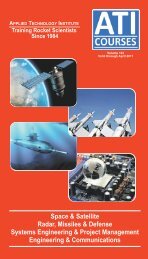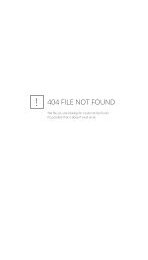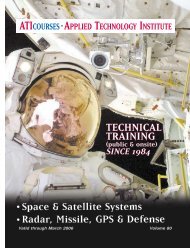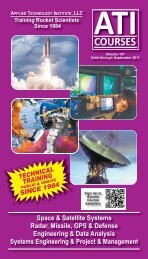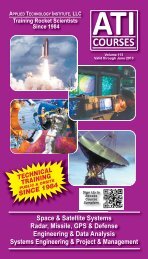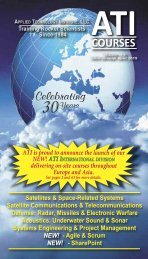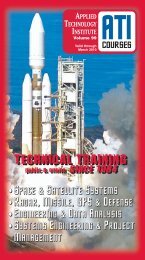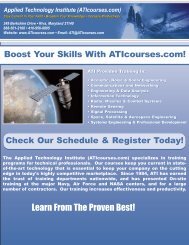Acoustics & Sonar Engineering Radar, Missiles & Defense Systems ...
Acoustics & Sonar Engineering Radar, Missiles & Defense Systems ...
Acoustics & Sonar Engineering Radar, Missiles & Defense Systems ...
Create successful ePaper yourself
Turn your PDF publications into a flip-book with our unique Google optimized e-Paper software.
March 13-14, 2012<br />
Columbia, Maryland<br />
$990 (8:30am - 4:30pm)<br />
"Register 3 or More & Receive $100 00 each<br />
Off The Course Tuition."<br />
Summary<br />
This two day workshop is an overview of test<br />
and evaluation from product concept through<br />
operations. The purpose of the course is to give<br />
participants a solid grounding in practical testing<br />
methodology for assuring that a product performs<br />
as intended. The course is designed for Test<br />
Engineers, Design Engineers, Project Engineers,<br />
<strong>Systems</strong> Engineers, Technical Team Leaders,<br />
System Support Leaders Technical and<br />
Management Staff and Project Managers.<br />
The course work includes a case study in several<br />
parts for practicing testing techniques.<br />
Instructors<br />
Eric Honour, CSEP, international consultant<br />
and lecturer, has a 40-year career<br />
of complex systems development &<br />
operation. Founder and former<br />
President of INCOSE. He has led<br />
the development of 18 major<br />
systems, including the Air Combat<br />
Maneuvering Instrumentation<br />
systems and the Battle Group<br />
Passive Horizon Extension System. BSSE<br />
(<strong>Systems</strong> <strong>Engineering</strong>), US Naval Academy,<br />
MSEE, Naval Postgraduate School, and PhD<br />
candidate, University of South Australia.<br />
Dr. Scott Workinger has led projects in<br />
Manufacturing, Eng. &<br />
Construction, and Info. Tech. for 30<br />
years. His projects have made<br />
contributions ranging from<br />
increasing optical fiber bandwidth<br />
to creating new CAD technology.<br />
He currently teaches courses on<br />
management and engineering and consults on<br />
strategic issues in management and technology.<br />
He holds a Ph.D. in <strong>Engineering</strong> from Stanford.<br />
Principles of Test & Evaluation<br />
Assuring Required Product Performance<br />
Course Outline<br />
1. What is Test and Evaluation? Basic definitions<br />
and concepts. Test and evaluation overview;<br />
application to complex systems. A model of T&E that<br />
covers the activities needed (requirements, planning,<br />
testing, analysis & reporting). Roles of test and<br />
evaluation throughout product development, and the<br />
life cycle, test economics and risk and their impact on<br />
test planning.<br />
2. Test Requirements. Requirements as the<br />
primary method for measurement and control of<br />
product development. Where requirements come from;<br />
evaluation of requirements for testability; deriving test<br />
requirements; the Requirements Verification Matrix<br />
(RVM); Qualification vs. Acceptance requirements;<br />
design proof vs. first article vs. production<br />
requirements, design for testability.<br />
3. Test Planning. Evaluating the product concept<br />
to plan verification and validation by test. T&E strategy<br />
and the Test and Evaluation Master Plan (TEMP);<br />
verification planning and the Verification Plan<br />
document; analyzing and evaluating alternatives; test<br />
resource planning; establishing a verification baseline;<br />
developing a verification schedule; test procedures and<br />
their format for success.<br />
4. Integration Testing. How to successfully<br />
manage the intricate aspects of system integration<br />
testing; levels of integration planning; development test<br />
concepts; integration test planning (architecture-based<br />
integration versus build-based integration); preferred<br />
order of events; integration facilities; daily schedules;<br />
the importance of regression testing.<br />
5. Formal Testing. How to perform a test;<br />
differences in testing for design proof, first article<br />
qualification, recurring production acceptance; rules for<br />
test conduct. Testing for different purposes, verification<br />
vs. validation; test procedures and test records; test<br />
readiness certification, test article configuration;<br />
troubleshooting and anomaly handling.<br />
6. Data Collection, Analysis and Reporting.<br />
Statistical methods; test data collection methods and<br />
equipment, timeliness in data collection, accuracy,<br />
sampling; data analysis using statistical rigor, the<br />
importance of doing the analysis before the test;,<br />
sample size, design of experiments, Taguchi method,<br />
hypothesis testing, FRACAS, failure data analysis;<br />
report formats and records, use of data as recurring<br />
metrics, Cum Sum method.<br />
This course provides the knowledge and ability<br />
to plan and execute testing procedures in a<br />
rigorous, practical manner to assure that a product<br />
meets its requirements.<br />
What You Will Learn<br />
• Create effective test requirements.<br />
• Plan tests for complete coverage.<br />
• Manage testing during integration and verification.<br />
• Develop rigorous test conclusions with sound<br />
collection, analysis, and reporting methods.<br />
Register online at www.ATIcourses.com or call ATI at 888.501.2100 or 410.956.8805 Vol. 109 – 27



